Advantages/Disadvantages of Excluding Small Farm Workers: Saudi Law
VerifiedAdded on 2022/08/14
|6
|1959
|15
Essay
AI Summary
This essay delves into the multifaceted implications of excluding workers on small farms from the Saudi Labor Law. It begins by outlining the core principles of the Saudi Arabian labor law, emphasizing its role in regulating employment relationships and worker rights, including the rights of non-Saudi workers. The essay then explores the potential advantages of excluding small farm workers, such as reduced operational costs and administrative burdens for small farms, potentially fostering business growth. However, the essay also critically examines the disadvantages, including the potential for exploitation of workers, the erosion of labor standards, and the denial of basic rights such as fair wages, safe working conditions, and access to legal recourse. The analysis considers the broader societal impacts, including the effects on economic development, social justice, and the overall labor market in Saudi Arabia. The essay concludes by summarizing the complex trade-offs inherent in this exclusion, highlighting the need for a balanced approach that protects workers' rights while promoting economic viability for small farms. It references various academic sources to support its arguments.
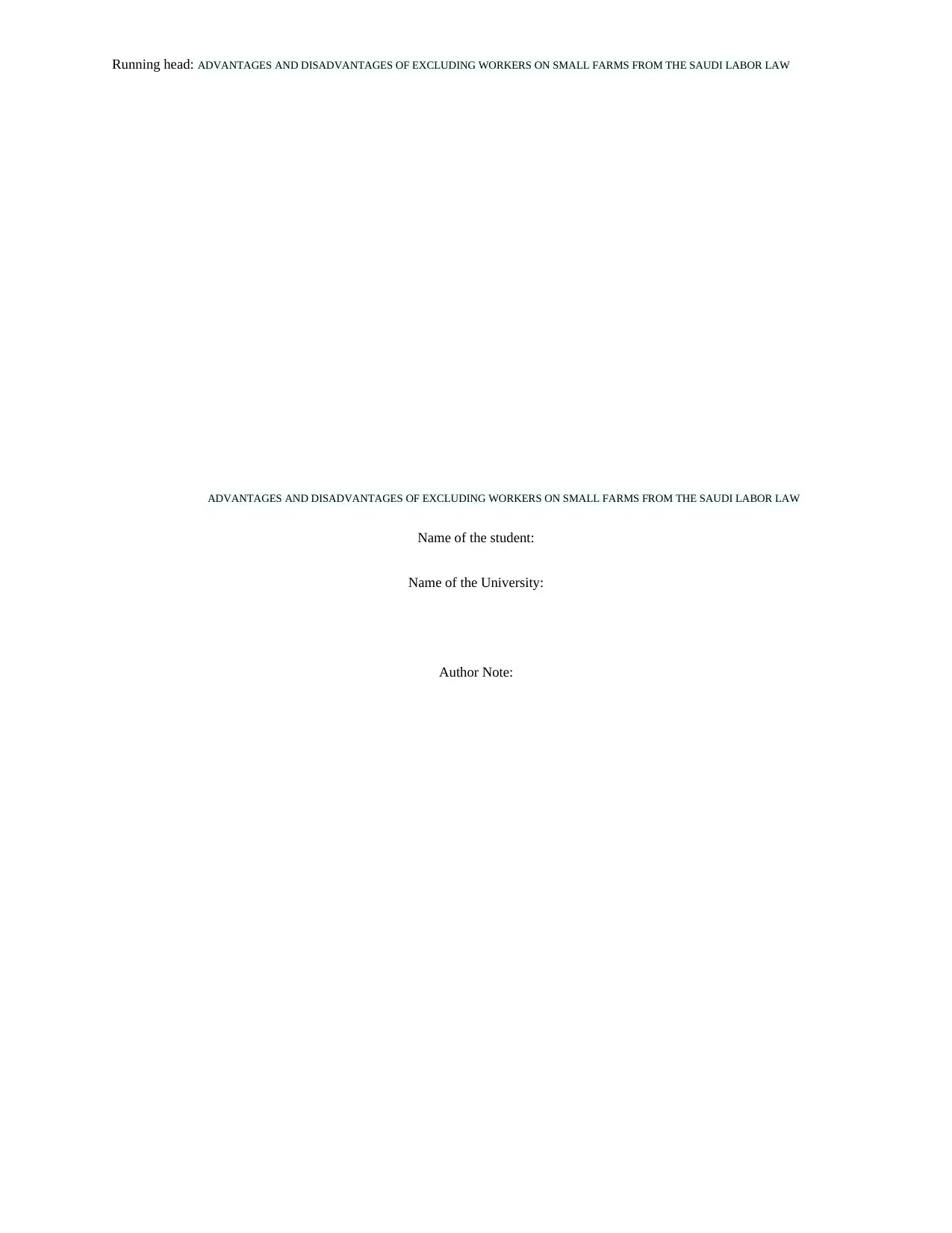
Running head: ADVANTAGES AND DISADVANTAGES OF EXCLUDING WORKERS ON SMALL FARMS FROM THE SAUDI LABOR LAW
ADVANTAGES AND DISADVANTAGES OF EXCLUDING WORKERS ON SMALL FARMS FROM THE SAUDI LABOR LAW
Name of the student:
Name of the University:
Author Note:
ADVANTAGES AND DISADVANTAGES OF EXCLUDING WORKERS ON SMALL FARMS FROM THE SAUDI LABOR LAW
Name of the student:
Name of the University:
Author Note:
Paraphrase This Document
Need a fresh take? Get an instant paraphrase of this document with our AI Paraphraser
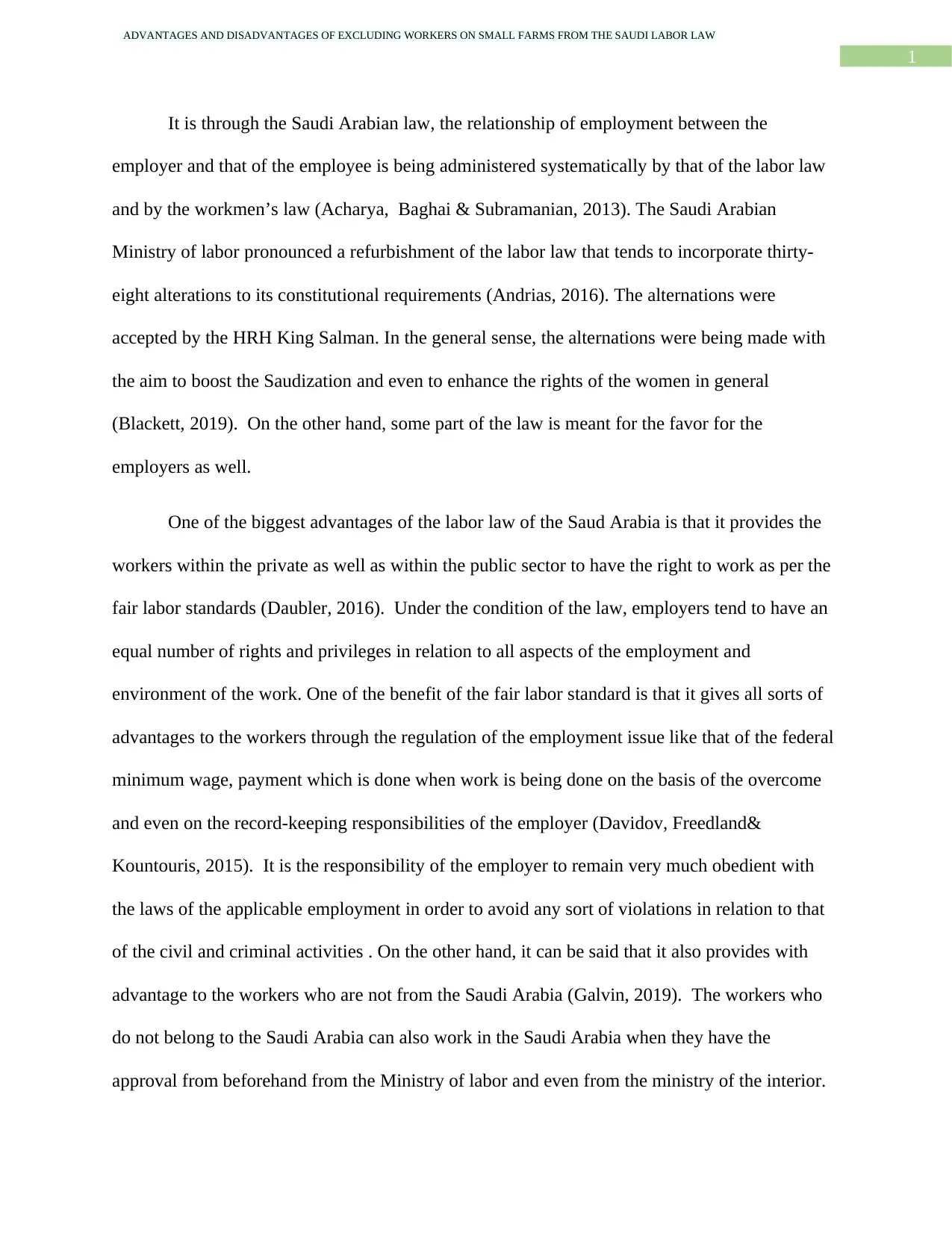
1
ADVANTAGES AND DISADVANTAGES OF EXCLUDING WORKERS ON SMALL FARMS FROM THE SAUDI LABOR LAW
It is through the Saudi Arabian law, the relationship of employment between the
employer and that of the employee is being administered systematically by that of the labor law
and by the workmen’s law (Acharya, Baghai & Subramanian, 2013). The Saudi Arabian
Ministry of labor pronounced a refurbishment of the labor law that tends to incorporate thirty-
eight alterations to its constitutional requirements (Andrias, 2016). The alternations were
accepted by the HRH King Salman. In the general sense, the alternations were being made with
the aim to boost the Saudization and even to enhance the rights of the women in general
(Blackett, 2019). On the other hand, some part of the law is meant for the favor for the
employers as well.
One of the biggest advantages of the labor law of the Saud Arabia is that it provides the
workers within the private as well as within the public sector to have the right to work as per the
fair labor standards (Daubler, 2016). Under the condition of the law, employers tend to have an
equal number of rights and privileges in relation to all aspects of the employment and
environment of the work. One of the benefit of the fair labor standard is that it gives all sorts of
advantages to the workers through the regulation of the employment issue like that of the federal
minimum wage, payment which is done when work is being done on the basis of the overcome
and even on the record-keeping responsibilities of the employer (Davidov, Freedland&
Kountouris, 2015). It is the responsibility of the employer to remain very much obedient with
the laws of the applicable employment in order to avoid any sort of violations in relation to that
of the civil and criminal activities . On the other hand, it can be said that it also provides with
advantage to the workers who are not from the Saudi Arabia (Galvin, 2019). The workers who
do not belong to the Saudi Arabia can also work in the Saudi Arabia when they have the
approval from beforehand from the Ministry of labor and even from the ministry of the interior.
ADVANTAGES AND DISADVANTAGES OF EXCLUDING WORKERS ON SMALL FARMS FROM THE SAUDI LABOR LAW
It is through the Saudi Arabian law, the relationship of employment between the
employer and that of the employee is being administered systematically by that of the labor law
and by the workmen’s law (Acharya, Baghai & Subramanian, 2013). The Saudi Arabian
Ministry of labor pronounced a refurbishment of the labor law that tends to incorporate thirty-
eight alterations to its constitutional requirements (Andrias, 2016). The alternations were
accepted by the HRH King Salman. In the general sense, the alternations were being made with
the aim to boost the Saudization and even to enhance the rights of the women in general
(Blackett, 2019). On the other hand, some part of the law is meant for the favor for the
employers as well.
One of the biggest advantages of the labor law of the Saud Arabia is that it provides the
workers within the private as well as within the public sector to have the right to work as per the
fair labor standards (Daubler, 2016). Under the condition of the law, employers tend to have an
equal number of rights and privileges in relation to all aspects of the employment and
environment of the work. One of the benefit of the fair labor standard is that it gives all sorts of
advantages to the workers through the regulation of the employment issue like that of the federal
minimum wage, payment which is done when work is being done on the basis of the overcome
and even on the record-keeping responsibilities of the employer (Davidov, Freedland&
Kountouris, 2015). It is the responsibility of the employer to remain very much obedient with
the laws of the applicable employment in order to avoid any sort of violations in relation to that
of the civil and criminal activities . On the other hand, it can be said that it also provides with
advantage to the workers who are not from the Saudi Arabia (Galvin, 2019). The workers who
do not belong to the Saudi Arabia can also work in the Saudi Arabia when they have the
approval from beforehand from the Ministry of labor and even from the ministry of the interior.
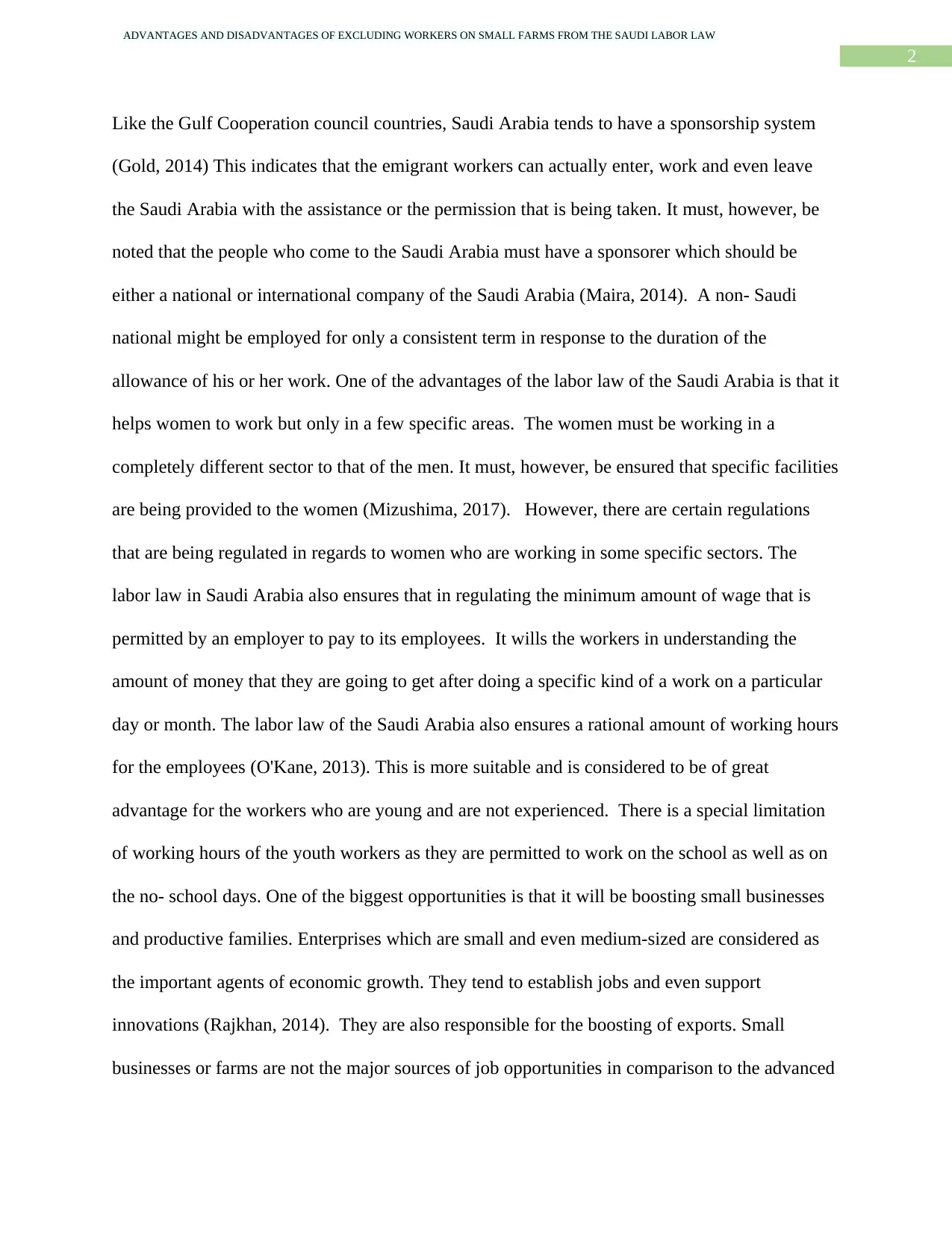
2
ADVANTAGES AND DISADVANTAGES OF EXCLUDING WORKERS ON SMALL FARMS FROM THE SAUDI LABOR LAW
Like the Gulf Cooperation council countries, Saudi Arabia tends to have a sponsorship system
(Gold, 2014) This indicates that the emigrant workers can actually enter, work and even leave
the Saudi Arabia with the assistance or the permission that is being taken. It must, however, be
noted that the people who come to the Saudi Arabia must have a sponsorer which should be
either a national or international company of the Saudi Arabia (Maira, 2014). A non- Saudi
national might be employed for only a consistent term in response to the duration of the
allowance of his or her work. One of the advantages of the labor law of the Saudi Arabia is that it
helps women to work but only in a few specific areas. The women must be working in a
completely different sector to that of the men. It must, however, be ensured that specific facilities
are being provided to the women (Mizushima, 2017). However, there are certain regulations
that are being regulated in regards to women who are working in some specific sectors. The
labor law in Saudi Arabia also ensures that in regulating the minimum amount of wage that is
permitted by an employer to pay to its employees. It wills the workers in understanding the
amount of money that they are going to get after doing a specific kind of a work on a particular
day or month. The labor law of the Saudi Arabia also ensures a rational amount of working hours
for the employees (O'Kane, 2013). This is more suitable and is considered to be of great
advantage for the workers who are young and are not experienced. There is a special limitation
of working hours of the youth workers as they are permitted to work on the school as well as on
the no- school days. One of the biggest opportunities is that it will be boosting small businesses
and productive families. Enterprises which are small and even medium-sized are considered as
the important agents of economic growth. They tend to establish jobs and even support
innovations (Rajkhan, 2014). They are also responsible for the boosting of exports. Small
businesses or farms are not the major sources of job opportunities in comparison to the advanced
ADVANTAGES AND DISADVANTAGES OF EXCLUDING WORKERS ON SMALL FARMS FROM THE SAUDI LABOR LAW
Like the Gulf Cooperation council countries, Saudi Arabia tends to have a sponsorship system
(Gold, 2014) This indicates that the emigrant workers can actually enter, work and even leave
the Saudi Arabia with the assistance or the permission that is being taken. It must, however, be
noted that the people who come to the Saudi Arabia must have a sponsorer which should be
either a national or international company of the Saudi Arabia (Maira, 2014). A non- Saudi
national might be employed for only a consistent term in response to the duration of the
allowance of his or her work. One of the advantages of the labor law of the Saudi Arabia is that it
helps women to work but only in a few specific areas. The women must be working in a
completely different sector to that of the men. It must, however, be ensured that specific facilities
are being provided to the women (Mizushima, 2017). However, there are certain regulations
that are being regulated in regards to women who are working in some specific sectors. The
labor law in Saudi Arabia also ensures that in regulating the minimum amount of wage that is
permitted by an employer to pay to its employees. It wills the workers in understanding the
amount of money that they are going to get after doing a specific kind of a work on a particular
day or month. The labor law of the Saudi Arabia also ensures a rational amount of working hours
for the employees (O'Kane, 2013). This is more suitable and is considered to be of great
advantage for the workers who are young and are not experienced. There is a special limitation
of working hours of the youth workers as they are permitted to work on the school as well as on
the no- school days. One of the biggest opportunities is that it will be boosting small businesses
and productive families. Enterprises which are small and even medium-sized are considered as
the important agents of economic growth. They tend to establish jobs and even support
innovations (Rajkhan, 2014). They are also responsible for the boosting of exports. Small
businesses or farms are not the major sources of job opportunities in comparison to the advanced
⊘ This is a preview!⊘
Do you want full access?
Subscribe today to unlock all pages.

Trusted by 1+ million students worldwide
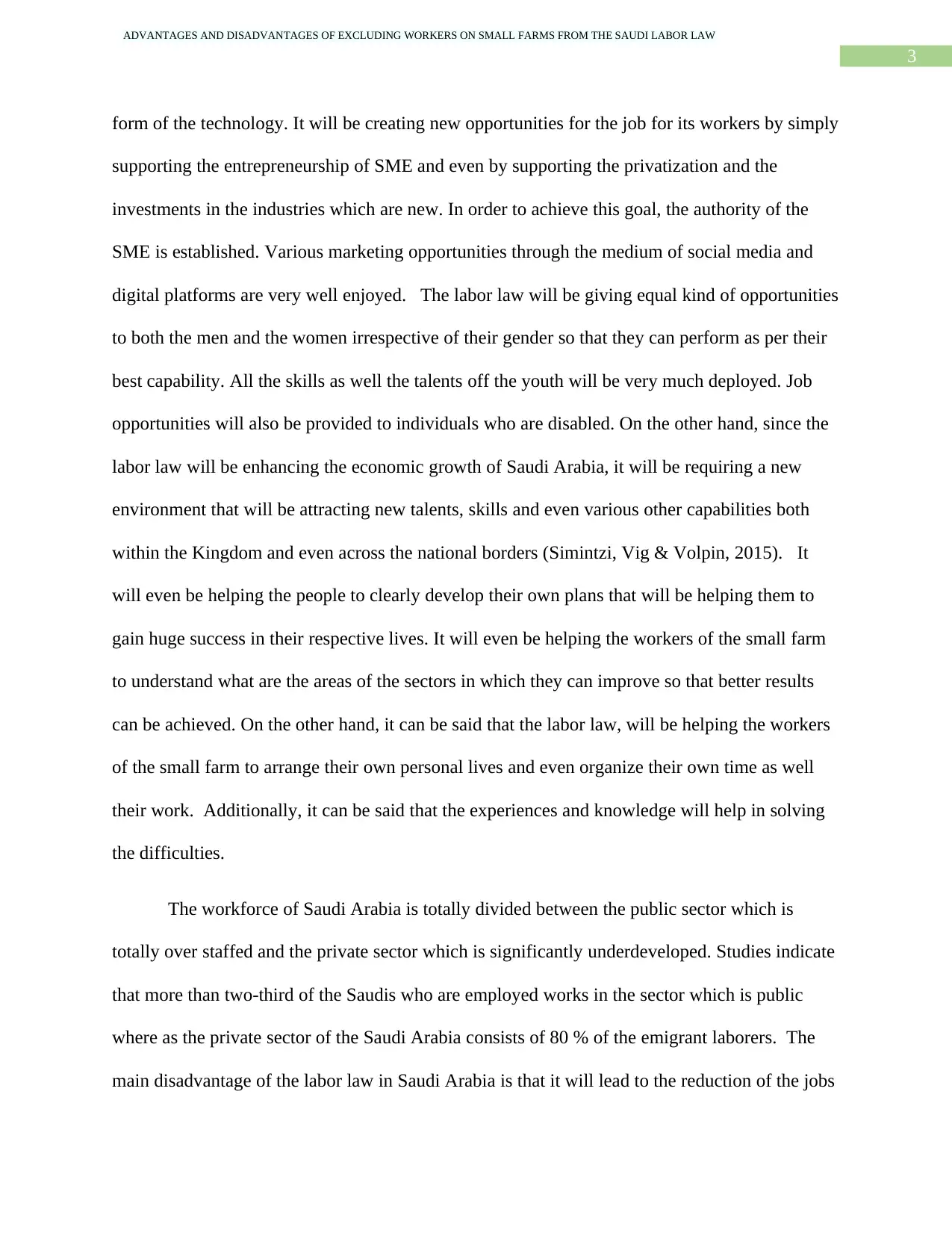
3
ADVANTAGES AND DISADVANTAGES OF EXCLUDING WORKERS ON SMALL FARMS FROM THE SAUDI LABOR LAW
form of the technology. It will be creating new opportunities for the job for its workers by simply
supporting the entrepreneurship of SME and even by supporting the privatization and the
investments in the industries which are new. In order to achieve this goal, the authority of the
SME is established. Various marketing opportunities through the medium of social media and
digital platforms are very well enjoyed. The labor law will be giving equal kind of opportunities
to both the men and the women irrespective of their gender so that they can perform as per their
best capability. All the skills as well the talents off the youth will be very much deployed. Job
opportunities will also be provided to individuals who are disabled. On the other hand, since the
labor law will be enhancing the economic growth of Saudi Arabia, it will be requiring a new
environment that will be attracting new talents, skills and even various other capabilities both
within the Kingdom and even across the national borders (Simintzi, Vig & Volpin, 2015). It
will even be helping the people to clearly develop their own plans that will be helping them to
gain huge success in their respective lives. It will even be helping the workers of the small farm
to understand what are the areas of the sectors in which they can improve so that better results
can be achieved. On the other hand, it can be said that the labor law, will be helping the workers
of the small farm to arrange their own personal lives and even organize their own time as well
their work. Additionally, it can be said that the experiences and knowledge will help in solving
the difficulties.
The workforce of Saudi Arabia is totally divided between the public sector which is
totally over staffed and the private sector which is significantly underdeveloped. Studies indicate
that more than two-third of the Saudis who are employed works in the sector which is public
where as the private sector of the Saudi Arabia consists of 80 % of the emigrant laborers. The
main disadvantage of the labor law in Saudi Arabia is that it will lead to the reduction of the jobs
ADVANTAGES AND DISADVANTAGES OF EXCLUDING WORKERS ON SMALL FARMS FROM THE SAUDI LABOR LAW
form of the technology. It will be creating new opportunities for the job for its workers by simply
supporting the entrepreneurship of SME and even by supporting the privatization and the
investments in the industries which are new. In order to achieve this goal, the authority of the
SME is established. Various marketing opportunities through the medium of social media and
digital platforms are very well enjoyed. The labor law will be giving equal kind of opportunities
to both the men and the women irrespective of their gender so that they can perform as per their
best capability. All the skills as well the talents off the youth will be very much deployed. Job
opportunities will also be provided to individuals who are disabled. On the other hand, since the
labor law will be enhancing the economic growth of Saudi Arabia, it will be requiring a new
environment that will be attracting new talents, skills and even various other capabilities both
within the Kingdom and even across the national borders (Simintzi, Vig & Volpin, 2015). It
will even be helping the people to clearly develop their own plans that will be helping them to
gain huge success in their respective lives. It will even be helping the workers of the small farm
to understand what are the areas of the sectors in which they can improve so that better results
can be achieved. On the other hand, it can be said that the labor law, will be helping the workers
of the small farm to arrange their own personal lives and even organize their own time as well
their work. Additionally, it can be said that the experiences and knowledge will help in solving
the difficulties.
The workforce of Saudi Arabia is totally divided between the public sector which is
totally over staffed and the private sector which is significantly underdeveloped. Studies indicate
that more than two-third of the Saudis who are employed works in the sector which is public
where as the private sector of the Saudi Arabia consists of 80 % of the emigrant laborers. The
main disadvantage of the labor law in Saudi Arabia is that it will lead to the reduction of the jobs
Paraphrase This Document
Need a fresh take? Get an instant paraphrase of this document with our AI Paraphraser
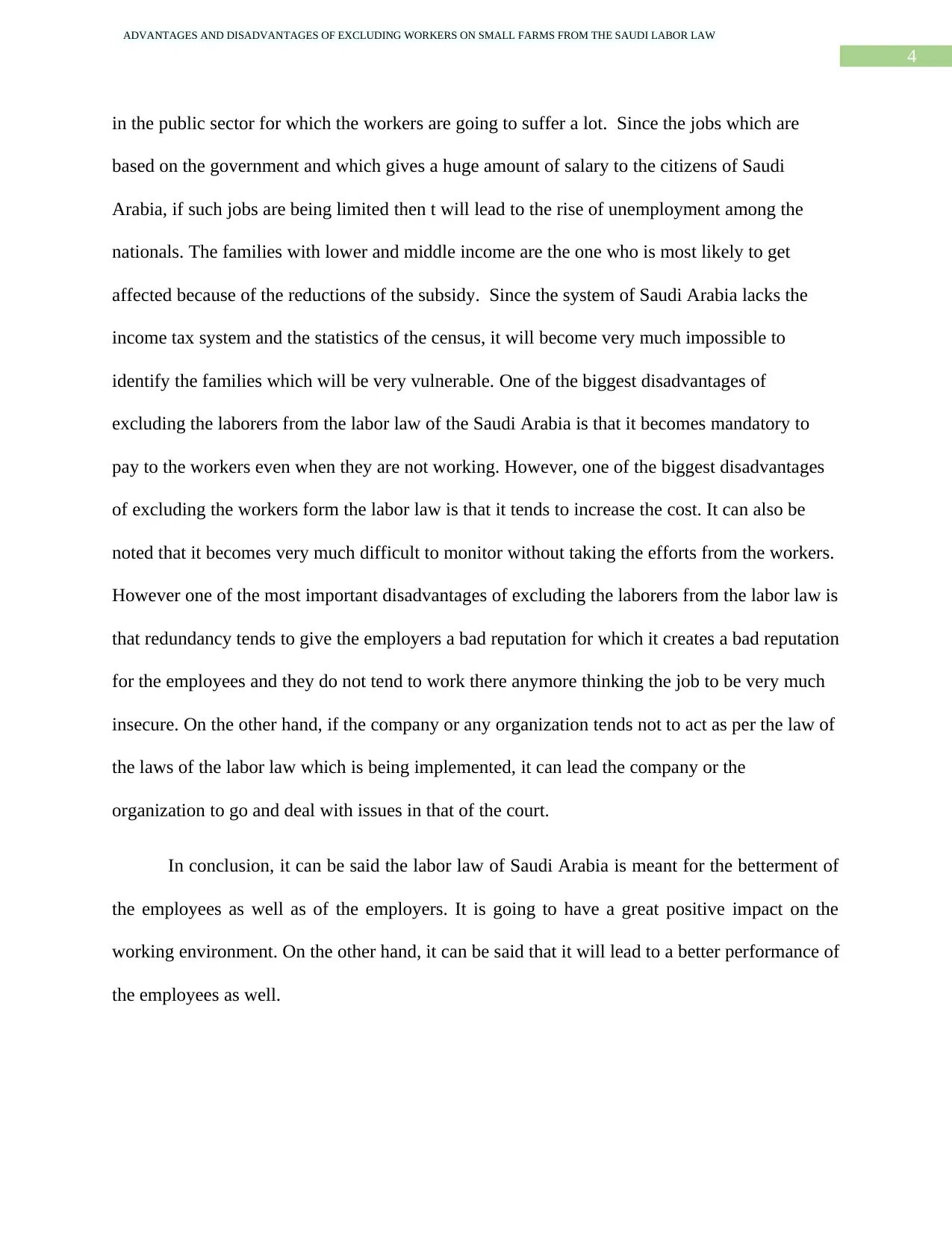
4
ADVANTAGES AND DISADVANTAGES OF EXCLUDING WORKERS ON SMALL FARMS FROM THE SAUDI LABOR LAW
in the public sector for which the workers are going to suffer a lot. Since the jobs which are
based on the government and which gives a huge amount of salary to the citizens of Saudi
Arabia, if such jobs are being limited then t will lead to the rise of unemployment among the
nationals. The families with lower and middle income are the one who is most likely to get
affected because of the reductions of the subsidy. Since the system of Saudi Arabia lacks the
income tax system and the statistics of the census, it will become very much impossible to
identify the families which will be very vulnerable. One of the biggest disadvantages of
excluding the laborers from the labor law of the Saudi Arabia is that it becomes mandatory to
pay to the workers even when they are not working. However, one of the biggest disadvantages
of excluding the workers form the labor law is that it tends to increase the cost. It can also be
noted that it becomes very much difficult to monitor without taking the efforts from the workers.
However one of the most important disadvantages of excluding the laborers from the labor law is
that redundancy tends to give the employers a bad reputation for which it creates a bad reputation
for the employees and they do not tend to work there anymore thinking the job to be very much
insecure. On the other hand, if the company or any organization tends not to act as per the law of
the laws of the labor law which is being implemented, it can lead the company or the
organization to go and deal with issues in that of the court.
In conclusion, it can be said the labor law of Saudi Arabia is meant for the betterment of
the employees as well as of the employers. It is going to have a great positive impact on the
working environment. On the other hand, it can be said that it will lead to a better performance of
the employees as well.
ADVANTAGES AND DISADVANTAGES OF EXCLUDING WORKERS ON SMALL FARMS FROM THE SAUDI LABOR LAW
in the public sector for which the workers are going to suffer a lot. Since the jobs which are
based on the government and which gives a huge amount of salary to the citizens of Saudi
Arabia, if such jobs are being limited then t will lead to the rise of unemployment among the
nationals. The families with lower and middle income are the one who is most likely to get
affected because of the reductions of the subsidy. Since the system of Saudi Arabia lacks the
income tax system and the statistics of the census, it will become very much impossible to
identify the families which will be very vulnerable. One of the biggest disadvantages of
excluding the laborers from the labor law of the Saudi Arabia is that it becomes mandatory to
pay to the workers even when they are not working. However, one of the biggest disadvantages
of excluding the workers form the labor law is that it tends to increase the cost. It can also be
noted that it becomes very much difficult to monitor without taking the efforts from the workers.
However one of the most important disadvantages of excluding the laborers from the labor law is
that redundancy tends to give the employers a bad reputation for which it creates a bad reputation
for the employees and they do not tend to work there anymore thinking the job to be very much
insecure. On the other hand, if the company or any organization tends not to act as per the law of
the laws of the labor law which is being implemented, it can lead the company or the
organization to go and deal with issues in that of the court.
In conclusion, it can be said the labor law of Saudi Arabia is meant for the betterment of
the employees as well as of the employers. It is going to have a great positive impact on the
working environment. On the other hand, it can be said that it will lead to a better performance of
the employees as well.
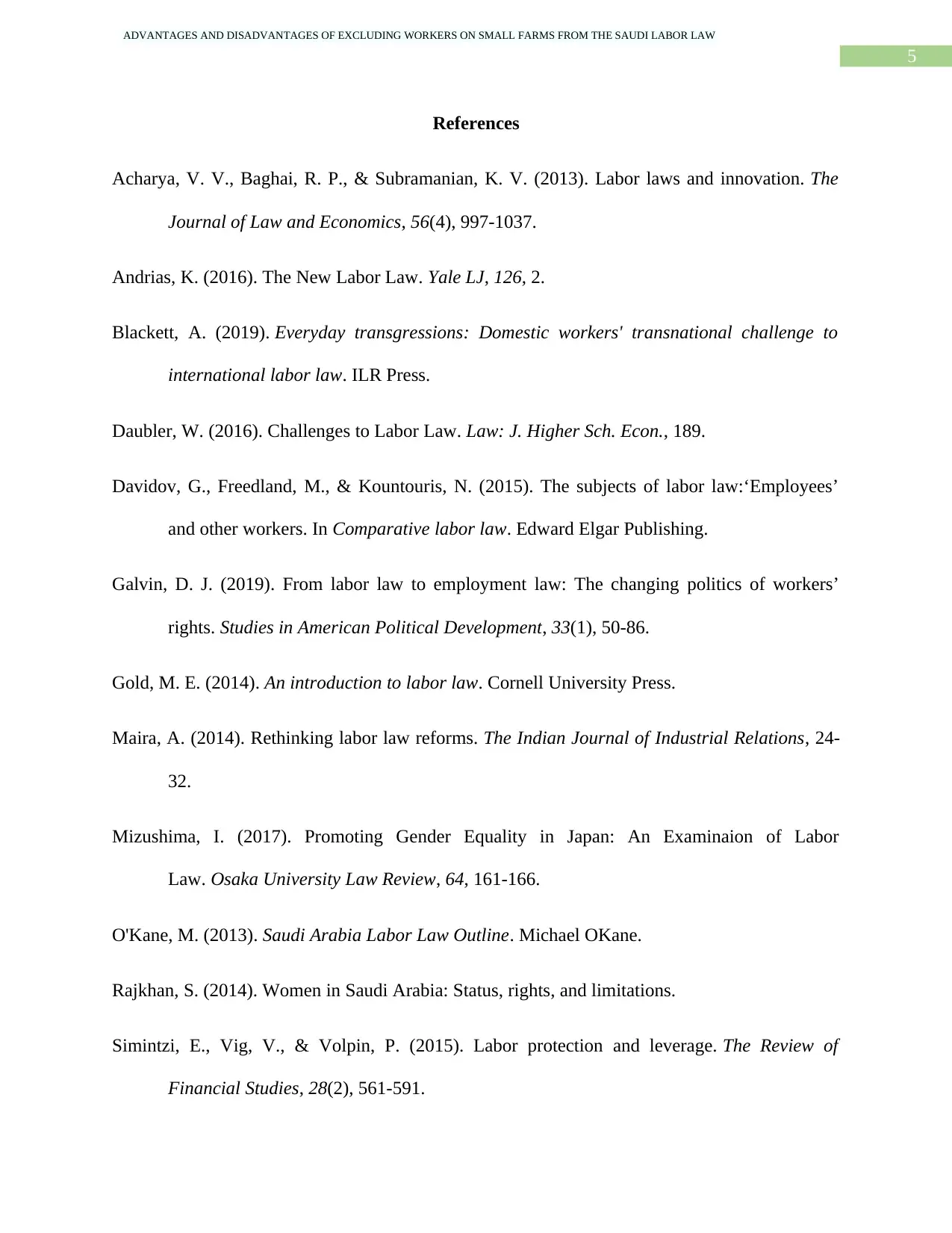
5
ADVANTAGES AND DISADVANTAGES OF EXCLUDING WORKERS ON SMALL FARMS FROM THE SAUDI LABOR LAW
References
Acharya, V. V., Baghai, R. P., & Subramanian, K. V. (2013). Labor laws and innovation. The
Journal of Law and Economics, 56(4), 997-1037.
Andrias, K. (2016). The New Labor Law. Yale LJ, 126, 2.
Blackett, A. (2019). Everyday transgressions: Domestic workers' transnational challenge to
international labor law. ILR Press.
Daubler, W. (2016). Challenges to Labor Law. Law: J. Higher Sch. Econ., 189.
Davidov, G., Freedland, M., & Kountouris, N. (2015). The subjects of labor law:‘Employees’
and other workers. In Comparative labor law. Edward Elgar Publishing.
Galvin, D. J. (2019). From labor law to employment law: The changing politics of workers’
rights. Studies in American Political Development, 33(1), 50-86.
Gold, M. E. (2014). An introduction to labor law. Cornell University Press.
Maira, A. (2014). Rethinking labor law reforms. The Indian Journal of Industrial Relations, 24-
32.
Mizushima, I. (2017). Promoting Gender Equality in Japan: An Examinaion of Labor
Law. Osaka University Law Review, 64, 161-166.
O'Kane, M. (2013). Saudi Arabia Labor Law Outline. Michael OKane.
Rajkhan, S. (2014). Women in Saudi Arabia: Status, rights, and limitations.
Simintzi, E., Vig, V., & Volpin, P. (2015). Labor protection and leverage. The Review of
Financial Studies, 28(2), 561-591.
ADVANTAGES AND DISADVANTAGES OF EXCLUDING WORKERS ON SMALL FARMS FROM THE SAUDI LABOR LAW
References
Acharya, V. V., Baghai, R. P., & Subramanian, K. V. (2013). Labor laws and innovation. The
Journal of Law and Economics, 56(4), 997-1037.
Andrias, K. (2016). The New Labor Law. Yale LJ, 126, 2.
Blackett, A. (2019). Everyday transgressions: Domestic workers' transnational challenge to
international labor law. ILR Press.
Daubler, W. (2016). Challenges to Labor Law. Law: J. Higher Sch. Econ., 189.
Davidov, G., Freedland, M., & Kountouris, N. (2015). The subjects of labor law:‘Employees’
and other workers. In Comparative labor law. Edward Elgar Publishing.
Galvin, D. J. (2019). From labor law to employment law: The changing politics of workers’
rights. Studies in American Political Development, 33(1), 50-86.
Gold, M. E. (2014). An introduction to labor law. Cornell University Press.
Maira, A. (2014). Rethinking labor law reforms. The Indian Journal of Industrial Relations, 24-
32.
Mizushima, I. (2017). Promoting Gender Equality in Japan: An Examinaion of Labor
Law. Osaka University Law Review, 64, 161-166.
O'Kane, M. (2013). Saudi Arabia Labor Law Outline. Michael OKane.
Rajkhan, S. (2014). Women in Saudi Arabia: Status, rights, and limitations.
Simintzi, E., Vig, V., & Volpin, P. (2015). Labor protection and leverage. The Review of
Financial Studies, 28(2), 561-591.
⊘ This is a preview!⊘
Do you want full access?
Subscribe today to unlock all pages.

Trusted by 1+ million students worldwide
1 out of 6
Related Documents
Your All-in-One AI-Powered Toolkit for Academic Success.
+13062052269
info@desklib.com
Available 24*7 on WhatsApp / Email
![[object Object]](/_next/static/media/star-bottom.7253800d.svg)
Unlock your academic potential
Copyright © 2020–2026 A2Z Services. All Rights Reserved. Developed and managed by ZUCOL.





